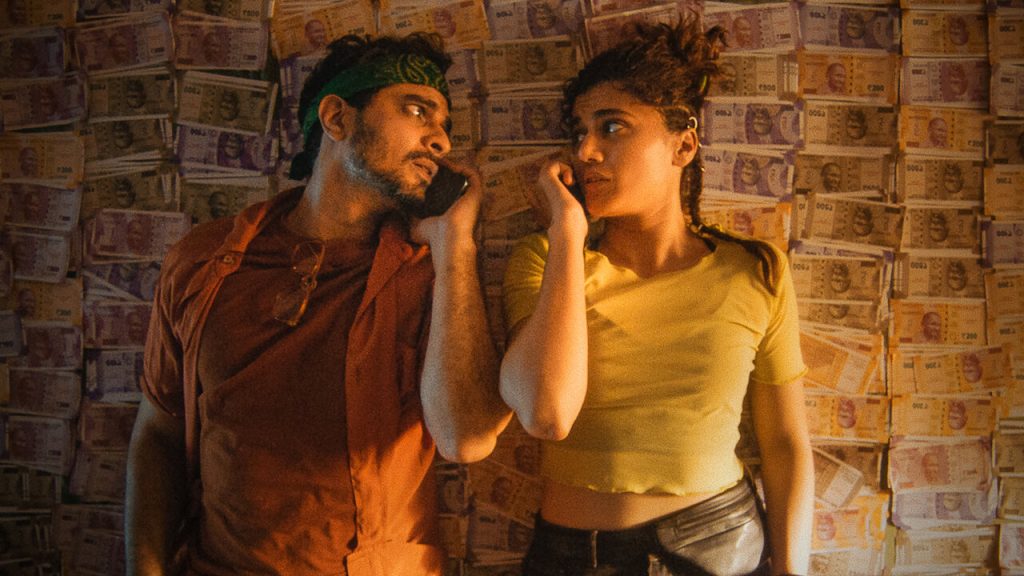Looop Lapeta (2022), currently streaming on Netflix, is remake of Tom Tykwer’s German film Run Lola Run (1998). No doubt, this desi remake does its best to keep viewers hooked with its cool sensibility and energetic style throughout. However, the film fails to deliver satisfactorily as debutant director Aakash Bhatia sacrifices narrative cohesiveness at the expense of delivering a stylish and sleek product.
In Looop Lapeta, Savina Boarkar (Taapsee Pannu) has to go through the arduous task of saving the life of her gambling and dope addicted boyfriend Satyajeet (Tahir Raj Bhasin). He has lost a sizeable amount of money belonging to his stern gangster boss, Victor (Dibyendu Bhattacharya). In the next fifty minutes, she will literally have to run pillar to post, leaving no stone unturned to protect the love of her life. Whether she will be successful in her attempt or not forms the basis of the film.
Like the original film, Looop Lapeta is also constructed in three distinct episodes, each of them restarting from the beginning. It is additionally ‘indianized’ to give us a contemporary spin on the mythological tale of Savitri and Satyavan. In fact, the first half of the names of the lead characters are Savi and Satya. Here Savina is the modern day counterpoint of the devoted Savitri who will bring her lover Satyajeet, representing Satyavan, back to life despite his death in two consecutive episodes. One has to admit, this aspect of the screenplay does add some gravitas and an additional layer to the narrative. However, for the rest of the film, the series of events are not convincingly woven into the script. In each of the episodes, the moment Savina leaves her apartment sprinting to save her boyfriend, everything appears to be far too convenient to be credible. On a number of occasions the intended humour also falls flat. It is only during the final episode that the emotional exchange between Savina and her father, Atul Boarkar (KC Shankar), provides some solid ground for us to root for the characters. Though some of the sequences are imaginatively constructed, they are stuffed together clumsily with a congested plot. Each and every character tries much too hard to be cool rather than actually rise to the challenges that the story offers.
Taapsee Pannu sincerely brings superb physical fitness and athletic prowess to her character but is unable to do anything more, defeated as she is by the script. Tahir Bhasin surprisingly comes off as a disappointment while Raghav Raj Kakker, Manik Papneja and Bhupesh Bandekar bring some comic relief to film in a caricaturish manner. Shreya Dhanwanthary, in the second episode, with her three minutes monologue scene, brings some much needed intensity to her brief role and KC Shankar also adds enough nuances to his role, convincingly portraying a character trying his best to perform his paternal duties. But it is the uncanny gangster, Victor, played by Dibyendu Bhattacharya, who steals the film from the rest of the cast, bringing in a comic flair with subtle flamboyance. His catchphrase “If you know what I mean” is a delight to hear every time.
Yash Khanna, the cinematographer, captures the world of the film with brightly colored palettes and ensures that the camera assiduously performs all the acrobatic movements at its disposal to make the film appear cool and trendy. But here too you cannot help but feel he tries to be too hip for his own good at times. But ultimately the cinematography goes nowhere in terms of creating taught tension or highlighting the emotional quotient of the characters and their circumstance. Similarly, the editing by Priyank Prem Kumar is much too fast paced. True, there is an urgency for Savina’s character through the film but here it seems more that the filmmaker was in some kind of hurry to finish the film. The split screens and rapid cuts are so sloppy that they distract from the film’s storyline. It is the production design by Pradeep Paul Francis and Diya Mukerjea that brings some authenticity to the real-life setting of Goa that matches well with the milieu of the film. And the musical score by Nariman Khambata and Rahul Pais does create a heady tempo for the film.
With its ostentatious display of technical finesse over the craft of storytelling, Looop Lapeta is a perfect example of a cinematic swagger losing out to content. With four screenwriters to its credit, this is a classic example of how too many cooks… If you know what I am trying to say.
Hindi, Thriller, Drama, Color
https://www.youtube.com/watch?v=bRN5m0sBJy8


